
Rhyming slang is a form of slang word construction in the English language. It is especially prevalent in the UK and Australia. It was first used in the early 19th century in the East End of London; hence its alternative name, Cockney rhyming slang. In the United States, especially the criminal underworld of the West Coast between 1880 and 1920, rhyming slang has sometimes been known as Australian slang.

Tom Jones is a 1963 British comedy film, an adaptation of Henry Fielding's classic 1749 novel The History of Tom Jones, a Foundling, starring Albert Finney as the titular hero. It was one of the most critically acclaimed and popular comedies of its time, and won four Academy Awards, including Best Picture. The film was produced and directed by Tony Richardson and the screenplay was adapted by playwright John Osborne.

The History of Tom Jones, a Foundling, often known simply as Tom Jones, is a comic novel by English playwright and novelist Henry Fielding. It is a Bildungsroman and a picaresque novel. It was first published on 28 February 1749 in London and is among the earliest English works to be classified as a novel. It is the earliest novel mentioned by W. Somerset Maugham in his 1948 book Great Novelists and Their Novels among the ten best novels of the world.
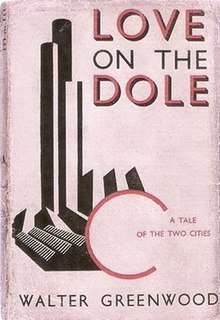
Love on the Dole is a novel by Walter Greenwood, about working class poverty in 1930s Northern England. It has been made into both a play and a film.
Walter Greenwood was an English novelist, best known for the socially influential novel Love on the Dole (1933).
A verse novel is a type of narrative poetry in which a novel-length narrative is told through the medium of poetry rather than prose. Either simple or complex stanzaic verse-forms may be used, but there will usually be a large cast, multiple voices, dialogue, narration, description, and action in a novelistic manner.
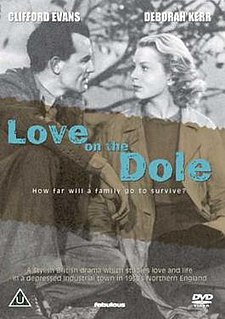
Love on the Dole is a 1941 British drama film starring Deborah Kerr and Clifford Evans. It was adapted from the novel of the same name by Walter Greenwood. It was the first English-made feature film to show English police wielding batons against a crowd.

Urban Gothic is a subgenre of Gothic fiction, film horror and television dealing with industrial and post-industrial urban society. It was pioneered in the mid-19th century in Britain, Ireland and the United States and developed in British novels such as Robert Louis Stevenson's Strange Case of Dr Jekyll and Mr Hyde (1886), and Irish novels such as Oscar Wilde's The Picture of Dorian Gray (1890), and Bram Stoker's Dracula (1897). In the twentieth century, urban Gothic influenced the creation of the subgenres of Southern Gothic and suburban Gothic. From the 1980s, interest in the urban Gothic revived with books like Anne Rice's Vampire Chronicles and a number of graphic novels that drew on dark city landscapes, leading to adaptations in film including Batman (1989), The Crow (1994) and From Hell (2001), as well as influencing films like Seven (1995).

Ruth Dunning was a Welsh actress of stage, television, and film.
Greenpark Productions Ltd is a British documentary film production company, founded by Walter Greenwood in Polperro, Cornwall in 1938. The company relocated to London in 1939. After the war it expanded into making upmarket corporate films. Amongst its roster of directors were Ken Annakin, Ralph Keene and Humphrey Swingler, brother of the poet Randall Swingler.

The Cure for Love is a 1949 British comedy film starring and directed by Robert Donat. The cast also includes Renee Asherson and Dora Bryan. The film was based on a hit play of the same name by Walter Greenwood about a mild-mannered soldier returning home after the Second World War.

The type of romance considered here is mainly the genre of novel defined by the novelist Walter Scott as "a fictitious narrative in prose or verse; the interest of which turns upon marvellous and uncommon incidents", in contrast to mainstream novels which realistically depict the state of a society. These works frequently, but not exclusively, take the form of the historical novel. Scott's novels are also frequently described as historical romances, and Northrop Frye suggested "the general principle that most 'historical novels' are romances". Scott describes romance as a "kindred term", and many European languages do not distinguish between romance and novel: "a novel is le roman, der Roman, il romanzo".

Saturday Night at the Crown is a 1959 novel by the British writer Walter Greenwood. It was his final novel, inspired by his 1954 play of the same title. The play had premiered in Morecambe in 1954 before running for 234 performances at the Garrick Theatre in London's West End from 1957 to 1958. He dedicated to the novel to Thora Hird who had starred in the play.

Down by the Sea is a 1956 novel by the British writer Walter Greenwood. It is the final entry of a trilogy set in the fictional fishing port of Treeloe in Cornwall. Durrall, the principal protagonist of the previous novel marries a woman and is able to prosper by opening his cottage as a tea house for tourists.

So Brief the Spring is a 1952 novel by the British writer Walter Greenwood. It is the first in the author's trilogy set in the fictional fishing port of Treeloe in Cornwall. It was developed out of a play which Greenwood had written in 1945. The novel is dedicated to Robert Newton who appeared in the play. It focuses on Randy Jollifer, formerly of the Royal Navy, attempting to settle down to postwar life in his home town. The book and its sequels sold steadily, without enjoying the spectacular popularity of his best-known work Love on the Dole.
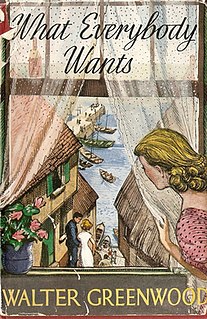
What Everybody Wants is a 1954 novel by the British writer Walter Greenwood. It is the second of a trilogy set in the fictional fishing port of Treeloe in Cornwall during the postwar years. While the principal character of the first novel Randy Jollifer reappears, there is a shift to focus on the life of Darky Durrant. Durrant is a local poacher of gypsy heritage who, despite a distinguished war record as a commando, lives on the margins of society.

The Secret Kingdom is a 1938 novel by the British writer Walter Greenwood. Like his best-known novel Love on the Dole it is set in Salford. It portrays the working-class socialist Byron family, and particularly the eldest daughter Paula who tries to establish an independent identity after finding working a parlour maid. She encounters Bert Treville in nearby Manchester and the two begin a courtship. After his death due to heavy drinking, she brings up her son Lance as a single-mother, throwing her effort into her talented child she is vindicated when he emerges as a talented concert pianist - performing on national radio in the final scene.

His Worship the Mayor is a 1934 novel by the British writer Walter Greenwood. It was his second novel, following on from the success of his bestselling debut Love on the Dole the previous year. His new work drew on his experience as a Labour councillor, and focuses on corruption in local government a theme also addressed in Winifred Holtby’s South Riding. The novel features Sam Grundy, the bookmaker who had appeared in Love on the Dole.
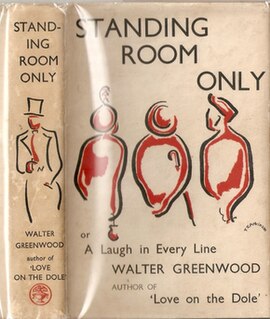
Standing Room Only is a 1936 comedy novel by the British writer Walter Greenwood. It was his third novel. Like his previous two, including his bestselling debut Love on the Dole, the work is partly set in his native Salford. The novel was somewhat self-reflexive as the protagonist Henry Ormerod strongly resembles Greenwood's own background and experiences. It was not as critically well-received as his two previous novels.
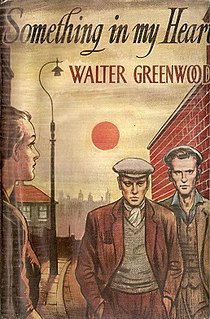
Something in My Heart is a 1944 novel by the British writer Walter Greenwood. It is a loose sequel to his debut and best-known novel Love on the Dole, a 1933 work set in Salford at the height of the Great Depression. This book presented a more optimistic view of a potential postwar future that was absent in the despair in the original novel.

















